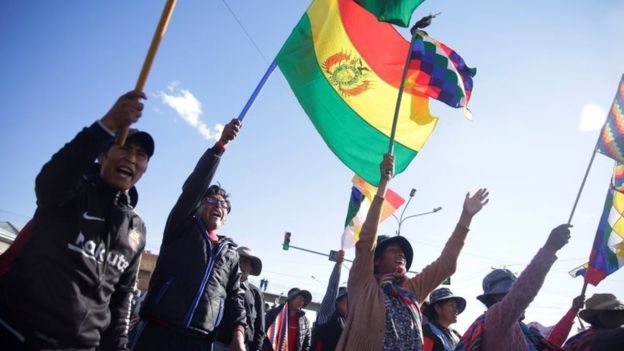
41 percent of Bolivian People future changed in 24 hours

About a month ago, anti-government protests started in Bolivia. People were demanding the resignation of President Ivo Morales for 14 years.
Given the increasing protests, Morales resigned and left the country and took refuge in Mexico. Here, former deputy speaker of the country, Janine Enias, declared herself the interim president.
But after this, the demonstrations took an even more fierce form and Morales’s supporters, the natives, took to the streets.
History associated with colonialism
On October 25, 2019, the results of the presidential election held in the Latin American country Bolivia five days ago i.e. on October 20, in which President Ivo Morales received 10 percent more votes than his rival Carlos Messi.
But a few moments after the announcement of victory, hundreds of protesters came out on the streets saying that elections have been manipulated.
Bolivia, the fifth largest country in South America, has been in the news for the past month due to its anti-government protests. This country with a population of more than 10 million is surrounded by Peru and Chile in the east, Brazil in the west and Argentina and Paraguay in the south.
The story of how Bolivia was named Bolivia is also interesting. It is the 16th century when many countries of Latin America used to be colonies of Spain. In 1538, Spain occupied the area we know today as Bolivia and it was made part of Peru.
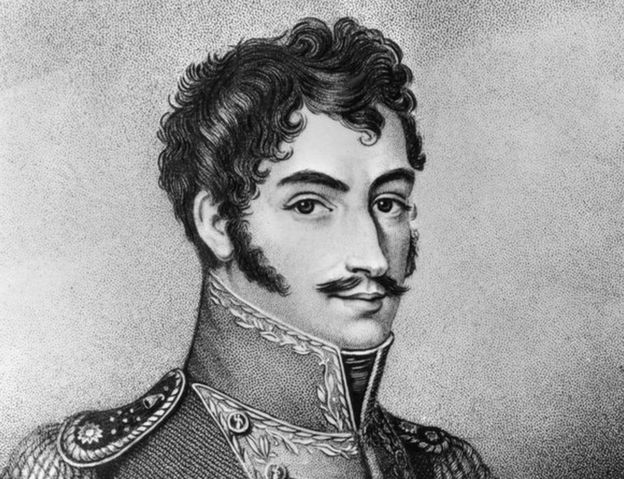
In 1808 when Napoleon invaded Spain. At that time, many Latin American countries were starting a war of independence from Spain.
Under the leadership of Venezuelan military leader Simón Bolívar, Latin American countries became independent – first Venezuela, then Ecuador, Peru, Colombia and then Panama.
Peru’s independence was fought under the leadership of Simón Bolívar’s confidant Marshal Antonio Khosé de Sucre.
Ultimately, Peru became independent in 1825. Where Simon Bolivar took power in Peru, after six months of the rule in Bolivia, he handed over power to Sucre. Sucre decided that the name of the country would be Bolivia in memory of Simon Bolivar.
Independence but the status of the original inhabitants did not change
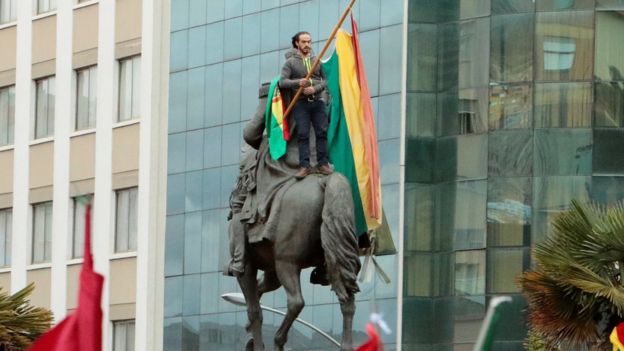
There was independence from Spain, but due to repeated conflicts and ignoring the large community of natives within the country, neither development work nor stability in power remained.
From 1825 onwards, military power and most of the presidents were overthrown. At the end of the 19th century, the situation changed slightly and the president was elected through voting, although the leadership of the country remained mostly in the hands of military officers.
Abdul Nafe, Retired Professor of the School of Foreign Studies at Delhi’s Jawaharlal Nehru University, explains, “There have been 37-40 military coups in Bolivia so far. The reason for this can be understood that historically Bolivia is a bad country. When If the Spanish were free, the whites lost, but the whites born here took power in their own hands. “
“It was strange independence for Bolivia in which there was no place for the original inhabitants. Their lands were seized, their languages were destroyed. But the number of the original inhabitants was so high that they were destroyed. Could not. “
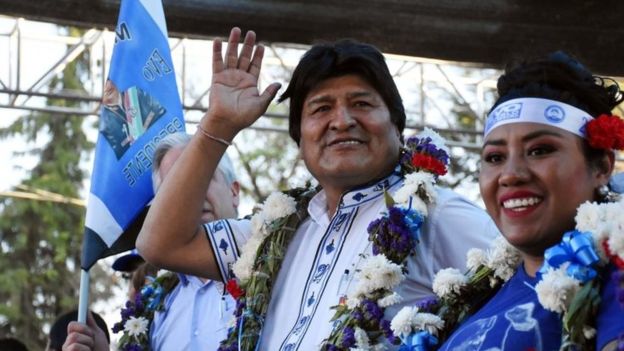
According to the 2012 census, 41 percent of the people are native in Bolivia and about 36 people live here.
But this huge community got a place in the power of the country and their language was recognized only after 2006.
In an interview with the Guardian in 2006, Ivo Morales spoke of discrimination against the natives.
He had said, “There was a lot of discrimination against the natives in the country. When I went to the city school, there I was called ugly. I did not know Spanish. People used to laugh at me and my language. Today the eyes of the people of the Aymara community, who studied 80-90 years ago, were taken out. The fingers of those who had learned to write were cut off, my grandmother and her accompanying people did not go to school. I could not get on the Plaza Pedro intersection. “
Evo Morales: The rise of leftist ideology or the need of the hour
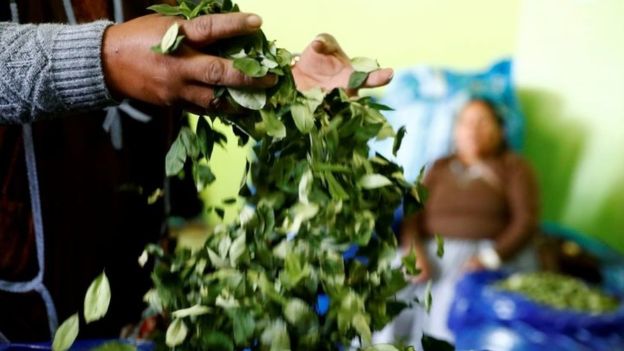
Bolivia’s economy is dependent on tin, silver, zinc, gold, lithium and natural gas used to make smartphone batteries.
Also, cocoa farming has an important contribution to the economy. Cocoa makes an intoxicating substance called cocaine and its leaves are also boiled like tea and drunk. Bolivia was the third-largest producer of cocoa in the world from 2000–2002.
From 1980 onwards, the US stepped up efforts to end cocoa cultivation in Bolivia. America said that Bolivia’s role in the supply of narcotics is important. Ivo Morales of the Aymara community opposed this.
Born into a family of farmers, Morales formed a cocoa farmers union in Cochabamba. In 2002, Morales stood in the presidential election but did not win. He finally became president in 2006, he is the first native of the country’s history to reach the throne.
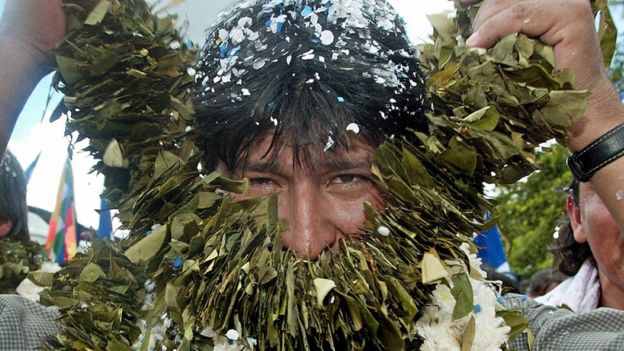
Known for his leftist ideology, Morales befriended Fidel Castro of Cuba and Hugo Chavez of Venezuela. He has been a very popular leader of Bolivia and continued to win elections. He was the President of Bolivia for a total of 13 years and 9 months.
His policies for fighting poverty and improving the economy were also praised. However, he also faced criticism internationally for not making any compromises in the case of cocoa cultivation.
Aparajita Gangopadhyay, head of the Department of International Relations at the Goa University, says, “Bolivia was in a terrible state of economic status. When Morales came, he first introduced the natives, made a place for them in the mainstream and together Nationalized all industries. Before they came, the team was that even drinking water was in private hands. “
Tension increased after the 2019 elections
But the matter got worse when Morales decided to contest for the fourth time, whose constitution of the country does not allow.
He won the presidential election but there was constant pressure on him. During these 24 hours of counting, Ivo Morales changed his future forever.
After counting 84 percent of the votes, the counting was abruptly stopped and the results of the counting were presented just 24 hours after that. Where previously the rival of Ivo Morales, was seen moving forward, now Morales was declared victorious.
Says Abdul Nafe, “I believe Morales made a mistake. There was a referendum in 2016 after which there was a general opinion in the country that he did not have the right to contest the fourth election under the constitution. First, he should not contest. The second. The counting of votes was stalled for 24 hours, which raised doubts in the minds of the people that rigging is taking place in the elections “.
“There was also a report of the Organization of American States (OAS) which said that there have been huge irregularities in the elections. This time, Morales’s supporters also turned against him that you are contesting and then manipulating him. “
Finally, on 10 November, Army Chief General Williams Kaliman intervened and asked Morales to resign as President.
General Kaliman said, “Given the situation within the country, we request the President to step down and help maintain peace. This will be better for the stability of Bolivia.”
Aparajita Gangopadhyay says that Venezuela is above Bolivia, where President Nicolas Maduro’s power crisis was deepened. There opposition leader Khwan Guido got international help but the army supported Maduro in the country. But the army in Bolivia was against Ivo Morales.
She says that what is happening in Bolivia also needs to be seen in the role of lithium which is used in smartphones and batteries. Bolivia signed China with lithium mines in 2019, which the army was opposed to.
She says, “Lithium is found in abundance in Bolivia. To be fair, Bolivia, Chile, and Argentina in South America are called lithium triangles. There has been opposition from the army in this and the army is Conservative and has a right-wing inclination. Many people are also saying that America is also against it because if China has more control over lithium mines, it will not be good for America. “
Morales resigned and said that the rightists have overthrown him. After this Morales left the country and took refuge in Mexico.
On November 12, Morales claimed that an angry mob looted and burned his house.
He said, “They burned my sister’s house the day before. They burned my house in Cochabamba. But my neighbors came to my rescue, whom I thank. I am deeply grateful to them.”
On 12 November, former deputy speaker Jeannine Enias declared herself the interim president of the country. Janine was elected to the Constituent Assembly to rewrite the constitution in 2006, she has been a staunch opponent of Morales.
Professor Aparajita Gangopadhyay says that Jenine is known for her right-leaning leanings and against the natives.
In 2013, she came into the limelight due to one of her tweets in which she said, “I want to see Bolivia free from devilish tribal customs. This city is not for the tribals, they should live in Chaco.”
When will the new government be formed?
Janine has also said that when Morales comes back to the country, he will have to face the law due to the rigging of elections and corruption charges against his government.
But the matter does not seem to stop here. The natives descended on the streets of Bolivia on Sunday and Monday, supporters of Ivo Morales. He has completely blocked traffic in many cities. He had clashes with the police in which 9 people died.
Professor Abdul Nafe says he was kept out of the mainstream for a long time and ignoring them will not be so easy now.
He says, “There is an atmosphere of fear and dread in Bolivia. When Morales left, he was the vice president. I think there will be violence, in the last 20 days, all those things have happened that should have happened in the last 10 years. Cochabamba As many areas are the bastion of the original inhabitants, there is a large population of it. There, I think there will be a lot of protests and violence. “
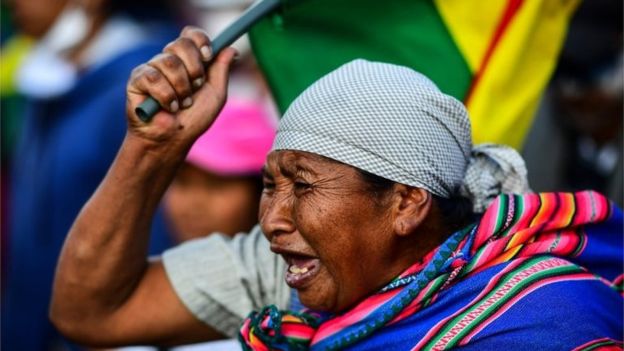
Professor Aparajita Gangopadhyay says that the protests of the natives were already taking place but the protests did not turn violent until Ivo Morales resigned.
She says that the original inhabitants have been expected for years but now it may be difficult to do so, “You cannot keep them out, you cannot separate them. You cannot tell them that you are not for this country It is. The nature of violence is very different. “
Interim President Jeannine Enias has promised that elections will be conducted transparently in the country within 90 days of Morales’s resignation.
Aparajita believes that if the elections are truly held and Ivo Morales’s party wins, then the contest can be reversed.
In his words, “If Jenny herself stands for elections” then it is difficult to say anything because her policies are anti-natives. But more than 40 percent of the population cannot be completely ignored, but to what extent they will get recognition, it has to be seen. “
The conflict in Bolivia at present is of identity, of the identity of the original inhabitants – who constitute 41 percent of the population.
Whose government will be formed next and whose side will be inclined, it is difficult to say, but still, the hope remains.

